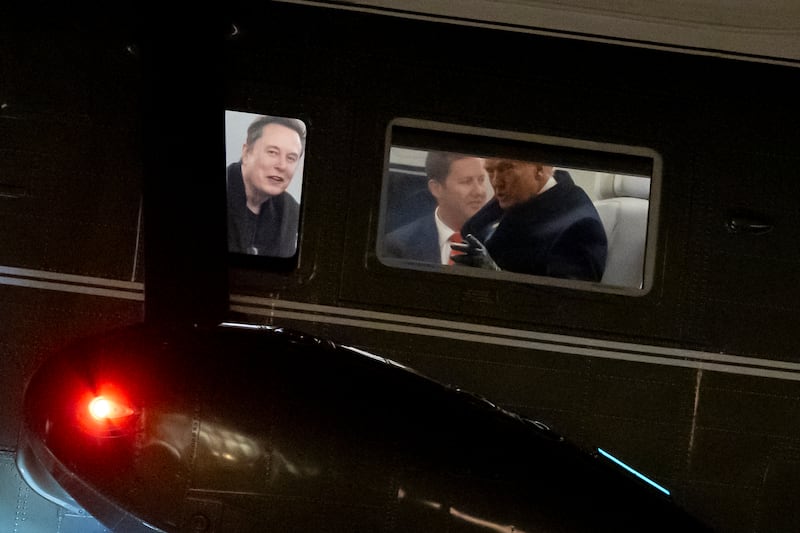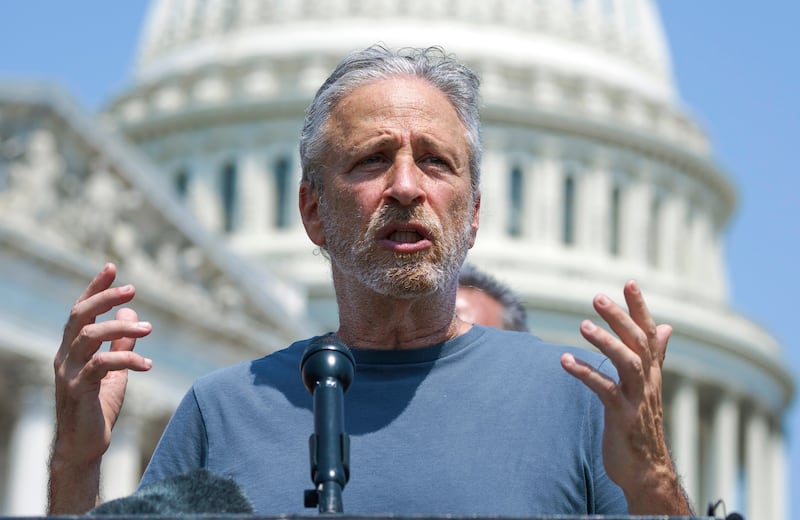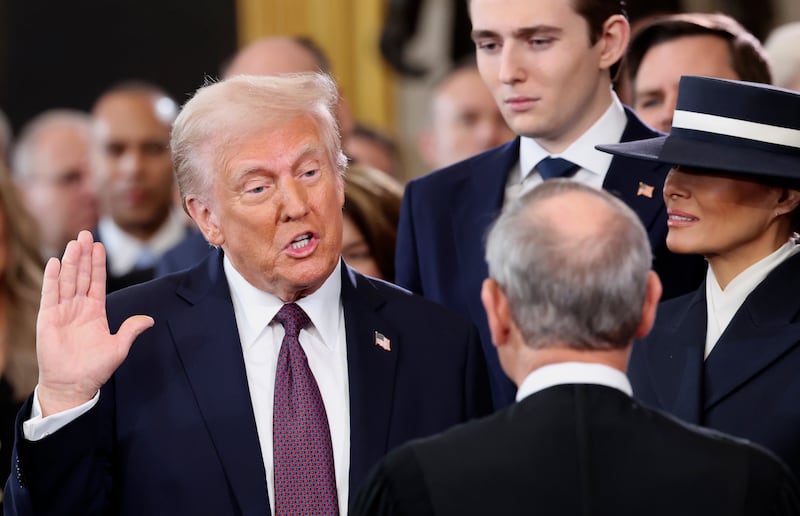No one disagrees that the new White House administration is moving very quickly. But do steps being taken amount to a legitimate constitutional crisis, as many are now alleging?
“I think we should be careful in describing our situation as a constitutional crisis. It’s a term that we should save for a real emergency,” said Yuval Levin, director of Social, Cultural and Constitutional Studies at the American Enterprise Institute (AEI), in a recent interview with Deseret News executive editor, Doug Wilks.
“It has to mean something, and I don’t think we’re in a place where we can say that.”
Levin explained, “A lot of our constitutional politics is a matter of action and reaction. We’ve seen a lot of actions from the president so far, and the question of what reactions are going to look like is still an open question. So, I think it’s much too soon to talk about a constitutional crisis. We have to see how the system responds to the pressures it’s under.”
When Levin was asked about whether he worried about the U.S. and its current resilience, the scholar acknowledged, “It makes sense to worry in a moment like this, when there’s a lot of pressure being put on the system.”
But he qualified: “I don’t think it makes sense to panic in this moment. We’re not in a place where the fundamentals of the system are being undermined. We’re in a place where the structure is being challenged, and that happens on a fairly regular basis in the American system of government.”
Levin’s views are aligned with other political science experts we’ve spoken with at Deseret News in recent weeks. For instance, James M. Curry, political science professor at the University of Utah, similarly told us, “I think it is generally premature to declare a constitutional crisis in the very short term when one or more branches appear to overstep their constitutional grounds.”
While some are raising more dire prognoses, most experts encourage caution before adopting hot-button labels this early in the administration. That includes Bret Stephens of The New York Times who cautioned against overreaction recently, writing, “I’m a little reluctant to draw hard-and-fast conclusions after a month of misgovernance.”
What is it, then, that constitutes a true constitutional crisis? And what are the factors and relevant context to help us know if and when that’s taking place?
The balance of powers at work?
Those we spoke with pointed to the founders’ original design for a system allowing for vigorous push-and-pull between competing powers as backdrop for what we’re witnessing.
“It’s hard to declare a crisis because the system was set up to have a lot of pushing and pulling as ambition counteracts ambition,” wrote Jeremy C. Pope, political science professor at BYU. Although agreeing that many of the new administration’s actions do “cut against norms and standard practices,” this Constitutional Government Fellow at The Wheatley Institute remarked, “I do think some people are being a bit quick to declare one.”
Nonetheless, “people are, in my view, right to worry and to raise the issue,” he said. “Some areas look closer to a crisis to me than others.”
The basic “nature of the checks and balances system,” Curry added, “puts the different branches of government into repeated political conflict with each other” — which eventually “spurs them to rein each other in.” That typically happens through longer-term action, he said, often reflected in a “years-long back and forth before a resolution is found.”
“This is checks and balances in action.”
It doesn’t “appear that we are yet at something that I would regard as a constitutional crisis,” agreed Matthew J. Burbank, University of Utah professor of political science. “Obviously, that language has been out there, but it’s primarily, I think, been used as a way to raise a set of concerns in language that’s probably a little overblown at this point, as far as I can tell.”
The system at work — or the system breaking?
Burbank highlighted the president’s executive order challenging birthright citizenship, by way of illustration. “That’s a case where the President’s actions ... by most objective observers, would be unconstitutional, right? The president doesn’t get to change the meaning of the Constitution based upon his preferences.”

But pushing back on the impulse to immediately label that a crisis, Burbank noted this executive order “got challenged pretty quickly. A judge said, ‘Okay, we’re suspending that order until we have a chance to hear more about this.’”
“That, in my mind, again, is not a constitutional crisis,” Burbank continued. “It’s just our system playing out in a way that’s fairly predictable.”
If the court issued a ruling like this and the president just disregarded the judge or tried to fire him, this scholar added, “then that would probably be a constitutional crisis. But again, we haven’t seen anything like that yet.”
“That does not mean opponents should not aggressively push back on a president or oppose actions they see as inappropriate,” Curry said. “Those steps are, in fact, the essence of checks and balances.”
Not easy to interpret
There are reasons why people are debating this. “It’s hard to know if you’re in a crisis in part because the branches are repeatedly in conflict over these things,” Curry acknowledged.
Contributing to the confusion, Curry said, “there are a lot of open constitutional questions about the proper powers of each branch, and what the president, the bureaucracy, or the Congress can and cannot do.” While some of these questions are more settled historically, others have seen interpretations evolve significantly over time.
Burbank said he understands why people want to use a language, saying, “you can also see why there might be some potential here for development of a constitutional crisis over the power of the executive.”
The core debate — what is usurping what?
While agreeing that conflict is inherent in the American political system, assistant professor of political science Darin Self from BYU believes that the current administration has pushed past the constitutionally designated processes to work through conflict.
“The reason why we use constitutions or regular institutions,” he said, “is that it creates a stable environment for political conflict when different parties are seeking to fulfill their preferences and promises.”
Once those rules are violated, Self added, it “opens the door for heightened conflict as the fight over resources and policy is not regulated by rules, but instead by who has the most power.”
“The Constitution is meant to establish the rule of law, not the rule of the arbitrary will of one officer of the government,” similarly said BYU political science professor Chris Karpowitz.
“The rule of law means that laws determine what is appropriate or not for government officials to do, not the officials themselves,” Self said.
For its part, the administration claims to be pushing back on threats on the government’s constitutional structure. As Elon Musk said in a Feb. 18 interview, “all we’re really trying to do here is restore the will of the people through the president.” Speaking of “an unelected bureaucracy,” he cited figures of 92% support for Kamala Harris among Washington, D.C., residents that he sees as indicative of biased sentiment among federal workers.

Calling partisan disagreements a ‘constitutional crisis’
Further complicating matters is the influence of the hyper-polarized atmosphere. “Partisanship colors what most activists and interested parties say,” Pope said, noting the reasonable points made by Democrats who are “highly worried about a constitutional crisis right now.”
“However, a big chunk of what they are worried about is, frankly, just policies that they oppose,” he said.
It’s important to separate “‘what is a violation of the Constitution?’ (from) ‘what is just a terribly bad idea that I oppose’?” Pope said.
“Those are not the same thing at all.”
In this sense, “constitutional crisis” is somewhat in the eye of the beholder, scholars emphasize — similar to other terms like “judicial activism” or “threat to democracy.”
Even comedian Jon Stewart has weighed in on using similarly loaded terms like fascism. “I’m very big on — and I know it’s annoying — but specificity and nuance,” Stewart said. “And I think if you cry ‘fascism’ at every administrative overreach, even the ones that are constitutionally OK, you will find yourself out of fascism bullets when the time really comes.”

“I think what the media has done over the past ten years is cry wolf, to the point where they numbed everybody.”
"I think what the media has done over the past ten years is cry wolf, to the point where they numbed everybody." Jon Stewart explains his POV on whether to call Trump "fascist." #AfterTheCut pic.twitter.com/FWneAS7VbK
— The Daily Show (@TheDailyShow) February 16, 2025
Burbank compared the varied usage of “constitutional crisis” to similarly “overheated rhetoric” being used by this current administration, quick to label environmental and diversity programs they disagree with as “waste and fraud.” He said, “again, is it just disagreement over the merits of a particular program, or is there actually fraud involved?”
“Presidential overreach and increasing levels of executive power is a real danger,” Pope said. Yet without a willingness to rein in one’s own party through balance of powers, “do you really oppose executive overreach, or do you just have a partisan or ideological objection to various ideas pushed by the other party?”
“I’ll believe the people that say they want to restrain presidents when they’re willing to do more than just oppose someone from the other party,” he said. A bipartisan coalition of legislators “rooted in something other than partisanship” is ultimately what is needed, he said.
The true signs of a constitutional crisis?
“I’d consider it ‘crisis,’” Curry said, “if over the long term power is overwhelmingly and broadly handed to one branch to such a degree that the other branches become meaningless or unimportant to governance.”
“A constitutional crisis is when there is extreme ambiguity and open conflict over the prerogatives of the three major branches of government designated by the U.S. Constitution,” said Self, adding that such a crisis could be recognized when institutional rules outlined in a constitution “no longer constrain” the most powerful actors, specifically the central executive. “We can think of this as whether there is the Rule of Law or not.”
The Constitution was “designed to structure how we make collective decisions about public policies,” Karpowitz said, calling it “the higher law that supersedes all other government decisions, including acts of Congress or the president.”
“The Constitution envisions a system in which each branch has a role in constraining or checking the other branches so that the power of government is limited in important respects,” he said. Given that, “when key players in that system ignore the limits the Constitution imposes, then the system itself is stressed. For example, if the courts were to decide that the president has taken actions that are not allowed under the Constitution but the President rejects those court decisions and instead simply asserts his own will, then a constitutional crisis may be at hand.”
“Alternatively, if one branch of government were to abdicate its responsibility to check the decisions of another branch,” Karpowitz continued, “then we face increased likelihood of a crisis, particularly if that abdication allows other branches to claim powers not granted by the Constitution.”
“A crisis is not, however, conservative presidents or members of Congress doing conservative things or liberal presidents or members of Congress pursuing liberal policies,” the BYU scholar continued. “We expect that the winners of free and fair elections will pursue their policy goals. But winning an election is not a license to undermine core elements of the constitutional system by ignoring the limits it imposes or by asserting or claiming powers that the Constitution does not grant.”


